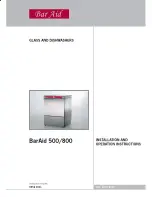
27
... there are problems when operating the dishwasher.
...the wash results are unsatisfactory.
The dishes are still dirty.
•
The wrong wash programme was selected.
•
The dishes were arranged in such a way as to
stop the water reaching all parts of the surface.
The baskets must not be overloaded.
•
The filters in the base of the washing compart-
ment are dirty or incorrectly positioned.
•
Too little or no detergent was used.
•
Where there are limescale deposits on the dishes:
The salt dispenser is empty or the water softener
unit is set wrongly.
•
The drain hose is incorrectly connected.
The dishes are wet and dull.
•
Rinse aid was not used.
•
The rinse aid container is empty.
There are streaks, milky spots or a bluish
coating on glasses and dishes.
•
Decrease rinse aid dosing.
Water drops have dried onto the glasses
and dishes.
•
Increase rinse aid dosing.
•
The detergent may be the cause. Contact the
detergent manufacturer's consumer advisor.
Fault
Possible cause
Remedy
The programme does
not start.
The dishwasher door has not been closed
properly.
Close the door.
The mains plug is not plugged in.
Insert the mains plug.
The fuse has blown in the household fuse
box.
Replace the fuse.
For dishwasher models with delay start
timer: Delay start has been selected.
Where dishes are to be washed imme-
diately, for appliances
- with multidisplay, set the delay start
to 0.
- without multidisplay, cancel the delay
start timer.
Spots of rust are visible
in the washing compart-
ment.
The washing compartment is made of anti-
corrosive stainless steel. Any spots of rust
inside the washing compartment stem from
other sources (flakes of rust from the water
pipe or from pans, cutlery etc.) Remove
such spots with a commercially available
stainless steel cleaner.
Only wash cutlery and dishes that are
suitable for dishwasher use.
Close the salt dispenser lid securely.
There is a whistling
noise during washing.
The whistling is not a cause for concern.
Use a different brand of detergent.














































